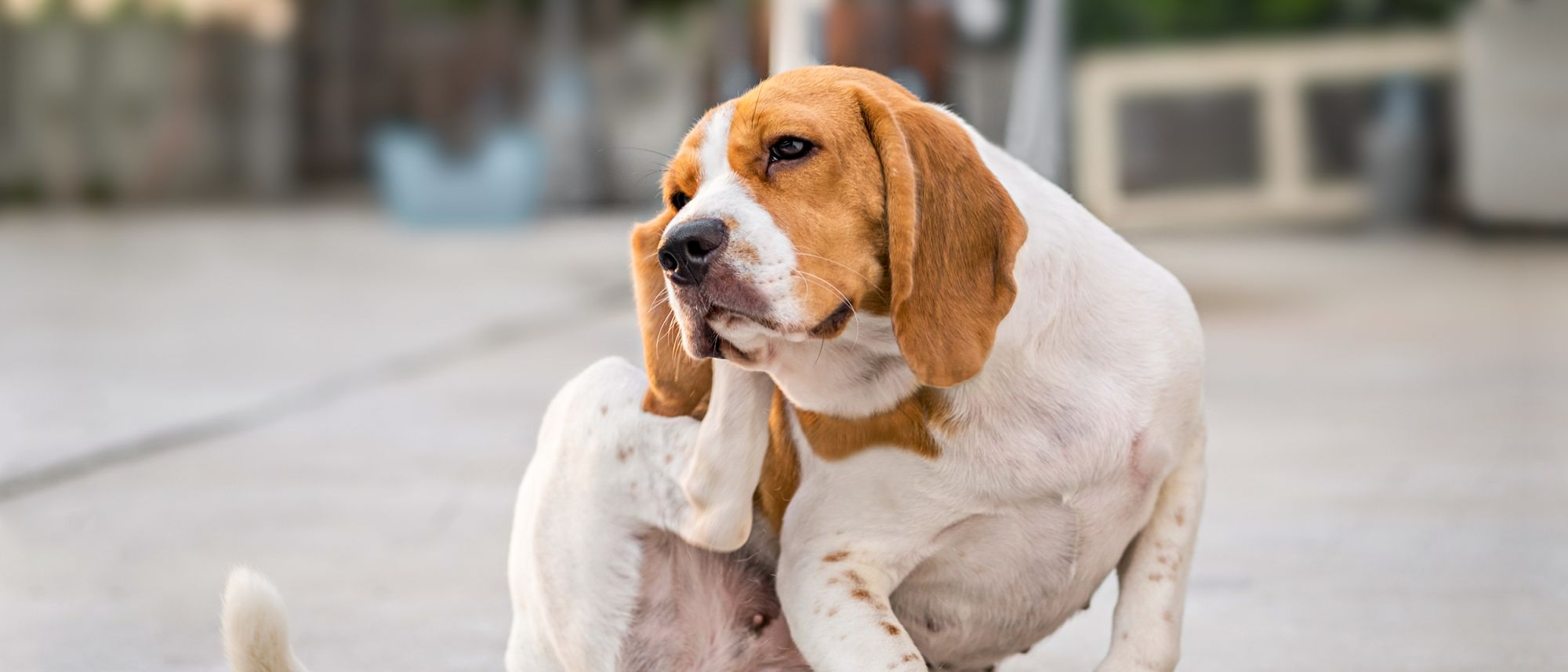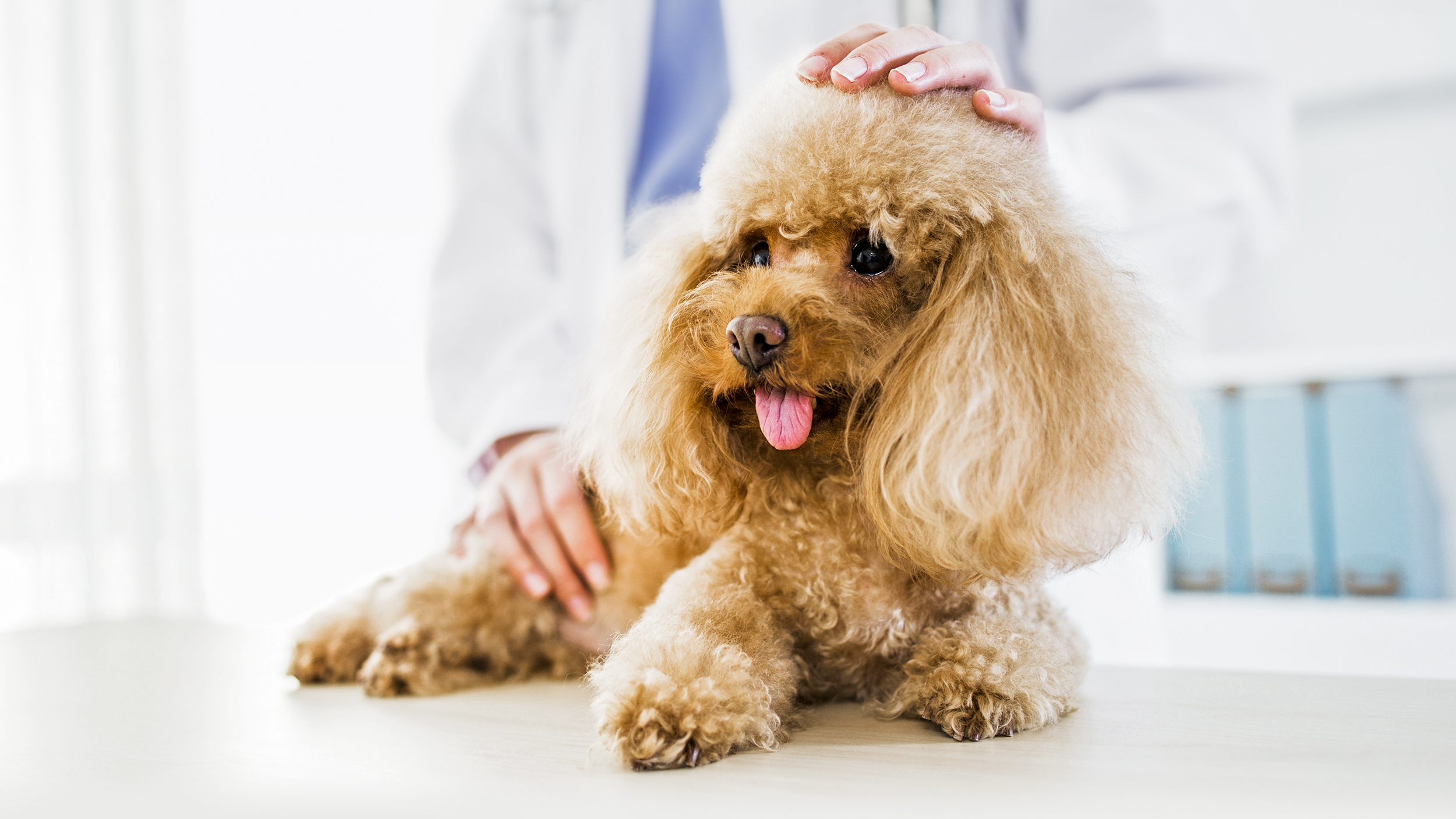Dog dandruff and dry skin

Your dog’s skin and coat
Your dog's skin and coat make up, on average, 12% of their body weight, and are important organ in their ongoing health and development. Their skin has three individual layers, each with a different function:
- The top layer, or epidermis, provides a barrier to external irritants
- The middle layer, or dermis, gives skin elasticity and resistance
- The bottom layer, or hypodermis, is rich in fat cells and insulation
Your dog’s skin provides critical protection against environmental factors and external parasites which could irritate your pet. Their skin also protects against water loss, regulates their body temperature and is responsible for housing the hairs of their coat. Your dog’s skin, therefore, must be looked after carefully to help support their overall health.
What is dandruff in dogs?
Dandruff occurs in dogs when the sebaceous glands – those responsible for producing the oils which protect and nourish the skin – start to overproduce. The excess oil can irritate the skin and lead to flakiness and shedding in greater quantities than normal, which is why cases of dog dry skin and dandruff are fairly common.
Symptoms of dog dry skin dandruff?
You’ll notice your dog’s skin looks dry and possibly irritated or inflamed. There will be white specks hooked on their coat, which may come off on their bedding or on your clothes. Depending on the severity of the dandruff and the cause, you may also notice scabs, general hair loss, irregular bald patches, and some scratching or itching.
Dog dandruff often appears in puppies, with medium and long-haired breeds at particular risk.

What’s causing dandruff in my dog?
One of the most common causes of dog dandruff is a diet which doesn’t include the necessary or highest-quality nutrients your dog needs to develop a healthy coat and skin. Essential fatty acids, like omega 3 and 6, are crucial for supporting your dog’s skin and as dogs can’t synthesise these internally, they have to be included in their diet. Similarly, protein is very important; your dog’s skin and hair uses 30% of their daily protein intake to grow and develop, so highly-digestible and high-quality protein sources need to be part of what they eat. Vitamin A is also key, as it helps regulate the growth of skin cells and the production of sebum.
Dandruff in dogs can also be caused by their environment. Seasonal shedding is normal for many breeds of dog, but if their space is particularly warm or cold it can trigger reactions in their skin and interrupt its oil production, which can then lead to dandruff. For example, a particularly warm environment can dry out your dog’s skin very quickly.
Dandruff can also be a symptom of a parasitic infestation. Biting lice, sucking lice and the cheyletiella mite can all cause dandruff as they live in the fur and irritate the skin. This encourages your dog to scratch and their skin to react. The cheyletiella mite in particular causes skin to peel off in scales, which leads to itching, dandruff and even hair loss.
How can I solve my dog’s dandruff problem?
If you notice your dog has ongoing dandruff, itching, scratching and other skin issues, it’s essential you talk to a vet; although dandruff is common, your vet will want to rule out any other problem such as atopic dermatitis. They’ll conduct an examination and tests and provide you with the right treatment for your pet, which is particularly important in the case of parasites.
You can also proactively manage dandruff in your dog by:
- Keeping its environment at a comfortable temperature
- Giving it a food which is rich in the nutrients it needs for healthy skin and hair
- Using appropriate specialist shampoos – human shampoo isn’t suitable, as our skin is more acidic and therefore even gentle products can dry out your dog’s skin
- Talking to your vet about supplementing your dog’s diet with cod liver oil or fish oil to boost their skin health
How your dog’s diet affects their skin health
The right diet can help support your dog’s skin in functioning effectively, and it needs to have the right mix of nutrients.
Your dog needs protein to build healthy skin and hair. Ideally, the protein must be highly digestible and from a high-quality source. This makes it easier for your dog's gastro-intestinal tract to digest and absorb the protein. Polyunsaturated fatty acids similarly support the development of skin and hair, and if the appropriate quantities of omega 3 and omega 6 fatty acids are present in your dog’s food, these can help to manage itching and skin irritation.
Their diet can also protect against external factors by including vitamins A, B and D, and encourage the proper functioning of skin cells with the inclusion of zinc. Copper is also used to help promote colour in their coat.
Dogs can be hypersensitive or even allergic to certain food components, which can result in signs of skin irritation.
If you have any concerns about the health of your dog’s skin, consult your vet who will be able to advise you on hypersensitivities, allergies and the best food for your pet.
Related Articles
Find a vet
If you have any concerns about your dog’s health, consult a vet for professional advice.
Like & share this page